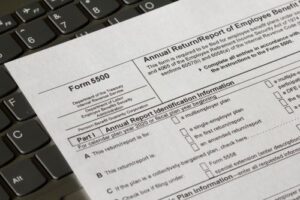2023 Form 5500 and Benefit Plan Audit Requirement Changes
 The Department of Labor (DOL) recently announced changes to Form 5500, effective for plan years that start on or after January 1, 2023. The announcement, made as a joint statement betweenthe DOL, IRS, and (PBGC) call for several important updates. These include an updated participant calculation methodology, changes to expense reporting on Schedule H, a new direct filing entity, and several new compliance questions. Several of these changes were considered as part of past rule updates but had not yet been enacted. To help clients, prospects, and others, Whipplewood CPAs has provided a summary of the key details below.
The Department of Labor (DOL) recently announced changes to Form 5500, effective for plan years that start on or after January 1, 2023. The announcement, made as a joint statement betweenthe DOL, IRS, and (PBGC) call for several important updates. These include an updated participant calculation methodology, changes to expense reporting on Schedule H, a new direct filing entity, and several new compliance questions. Several of these changes were considered as part of past rule updates but had not yet been enacted. To help clients, prospects, and others, Whipplewood CPAs has provided a summary of the key details below.
What is Form 5500?
The annual report of an employee benefit plan is provided via Form 5500, which is filed with the DOL, IRS, and PBGC. All employee benefit plans that are subject to the Internal Revenue Code and the Employee Retirement Income Security Act of 1974 (ERISA) need to submit this filing, which includes information on plan qualifications, financial information, and operational details. In addition, plans with at least 100 eligible participants are required to conduct an annual plan audit and include the audit report along with the filing.
Changes to Participant Thresholds
The threshold plans must meet to trigger the annual audit requirement has not changed, but how participants are counted has been updated. To be part of the 100-120 participant count, only participants that have an account balance at the beginning of the plan year should be considered. This is a significant change because the IRS estimates the number of plans required to undergo the annual audit under the new calculation method will drop by over 18,000 plans.
Defined Contribution Retirement Plan Group (DCG)
There is also a new type of entity available for defined contribution retirement plans called a Defined Contribution Retirement Plan Group, or DCG. While employers can offer a defined contribution retirement plan through these entities without having to establish their own plan, they are still required to report the way other large plans do and would still require a plan-level audit like they are being filed separately.
Schedule H Administrative Expense Reporting
Administrative expenses will now be broken out on Schedule H into more than four different categories. Previously, expenses were segregated into contract administrator, professional, investment advisory/management, and other expenses. Starting in 2023, Schedule H will include several sub-categories designed to provide additional transparency with participants and regulators. Some of these include Salaries and allowances, Contract administrator fees, other recordkeeping fees, actuarial fees, Legal fees, valuation/appraisal fees, other Trustee fees/expenses and other expenses.
New Form 5500 Questions
There are several new questions on the 2023 Form 5500 designed to make it easier for regulators to collect important information and identify plans which may have a higher rate of non-compliance. One new addition includes questions on nondiscrimination and coverage tests. Responses are useful in helping the IRS plan pre-examination analysis and narrow additional information requests from the plan sponsor. There is also a question about Average Deferral Percentage (ADP) testingand whether a plan was adopted using a favorable IRS Opinion Letter.
Contact Us
The recently announced changes will impact plan sponsors in Denver and across Colorado. While some updates are designed to drive additional transparency, it is important to carefully review the changes to determine how your situation will be impacted. If you have questions about the information outlined above or need assistance with your benefit plan audit, Whipplewood CPAs can help. For additional information call 303-989-7600 or click here to contact us. We look forward to speaking with you soon.
About the Author

Ron Bass CPA
Ron has led WhippleWood’s auditing practice since 2010. His career began in 1990 and includes time spent as a private company controller and ten years as an auditor for the largest CPA firm in Florida. He has audited publicly traded corporations, consolidated international corporations, state and local regulatory agencies, employee benefit plans, internal processes and controls, and nonprofit entities.


